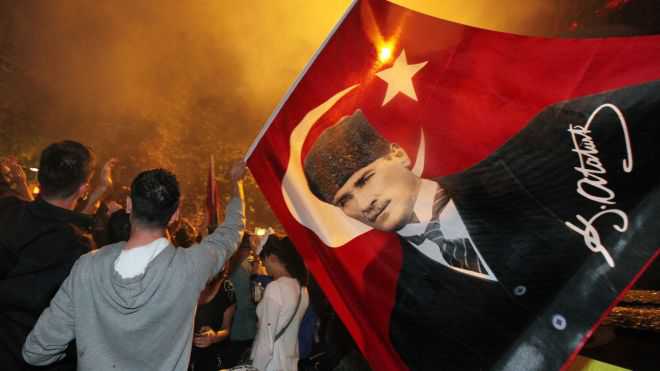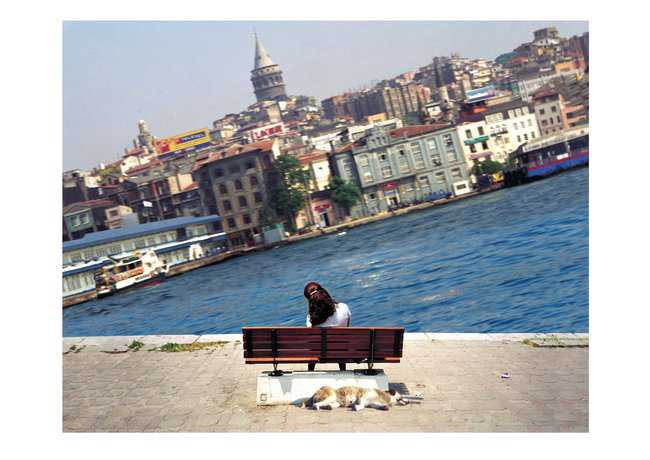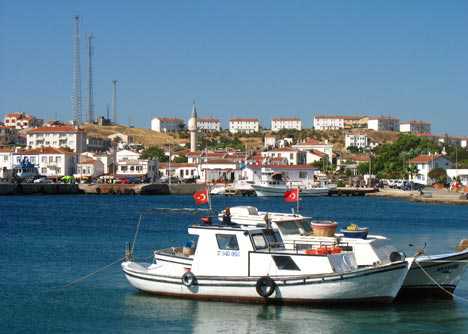Turkish legislators are set to debate a measure under which the foreign debts of Turkish banks would be guaranteed by the government, provided Prime Minister Recep Tayyip Erdogan approves the proposal, Turkish daily Vatan reported Nov. 6.
Category: News
-

The Annual Ataturk Lecture by Professor Heath Lowry
Turkish Embassy Lecture Series
PLEASE RSVP TO [email protected]
Please note the change in RSVP addressThe Embassy of Turkey
& The American Friends of Turkeycordially invite you to
A Special Lecture By Professor Heath Lowry
“WERE ATATURK ALIVE TODAY”
In commemoration of the 70th anniversary of Mustafa Kemal Atatürk’s passing
November 10, 2008 – 6.30 pmCOMMEMORATION OF ATATURKOver the years, the Turkish nation has immortalized Atatürk through impressive development and far-reaching reforms along his dynamic principles. Every year we commemorate this great leader, a towering figure in world history, by remembering aspects of his achievements and fulfilling his dreams.
DR. HEATH LOWRYDr. Heath W. Lowry is a Mustafa Kemal Ataturk Professor of Ottoman and Modern Turkish Studies at the Department of Near Eastern Studies at Princeton University. His most recent publications include a series of three books on early Ottoman history: The Nature of the Early Ottoman State. Albany (SUNY Press), 2003; and Ottoman Bursa in Travel Accounts. Bloomington (Indiana University: Ottoman and Modern Turkish Studies Publications), 2003.
2525 Massachusetts Avenue, NW, Washington, D.C.
Please RSVP at (202) 387 3200 or at [email protected]
ID required at entranceEmbassy of the Republic of Turkey
2525 Massachusetts Ave. NW, Washington, DC 20008
Phone: (202) 612-6700
Fax: (202) 612-6744
Contact us via e-mailClick here to unsubscribe.
-

Turkey: AK Party Deputy Resigns
November 7, 2008
Dengir Mir Mehmet Firat, deputy chairman of Turkey’s Justice and Development (AK) Party and one of Prime Minister Recep Tayyip Erdogan’s closest advisers, resigned from his post, according to Nov. 7 media reports that cited an AK Party member. Firat was replaced
-

The right man at the right time
TDN den bir alinti,
Thursday, November 6, 2008
MUSTAFA AKYOLWASHINGTON – On the very last night of his tireless, 21-month-long campaign for the presidency, Senator Barack Obama, who is now appropriately termed “President-elect,” spoke to a huge crowd in Manassas, Virginia. In a vast open field, he found almost 100,000 people who had been waiting for hours to hear his voice. And I was among them.Manassas is just an hour drive from the U.S. capital. But that day, it took me five hours to get there and three hours to come back. It must have been the same for all those Obama sympathizers who hit the jam-packed road to see the most stellar American politician in decades, the night before his very likely victory. What made all this even more remarkable is that Virginia has been a “red state,” one that votes repeatedly Republican, for almost 40 years. But it was time for change for Virginia, like several other formerly red states that have gone “blue” and embraced the Democratic candidate.The Obama nation:
“Change” and “hope” have been the two major themes of Obama’s campaign. These are very relevant mottos, first of all, the current situation of the United States. Eight years of Republican rule has left behind a disastrous war, an irritated world and a ruined economy. President Bush turned out to be one of the least popular presidents of all time. So, in one sense, it was only natural for Americans to look for a new direction.
But Obama did a great job in channeling that search into mass support for his campaign. In other words, his personal qualities have played a major role in the spectacular rise of the “Obama nation,” as one harshly critical book title named it. First, he is a man of charisma. His face and posture have iconic-like features that one can clearly see in the countless numbers of Obama pins, t-shirts and posters these days on American streets. His language is not just intellectually sound but also popularly accessible. He knows how to create simple mottos to promote complicated policies. “We do not need a big government or a small government as it is endlessly debated,” he said to the Virginian crowd Monday night. “That is an old debate.” What Americans need, he argued, was “smart government, effective government.”
Just like that, Obama discharges deep-seated frictions in U.S. politics and takes people to a whole new, and different level. One thing he did was to move beyond poisonous partisan politics that his opponents, and most notably the often clueless Sarah Palin, have used. Obama was labeled by them as “a friend of terrorists,” a “radical socialist” and a collaborator with enemies of United States. Yet he did not return the disfavor. As he emphasized in the Virginia rally, although his campaign strongly criticized the Republicans, it never lowered the tone to the level of insult and libel. He did not even hesitate in acknowledging the virtues of his rival. “In the previous years Senator McCain has differed from George Bush on issues such as torture and global warming,” Obama said. “He deserves credit for that.” But the Republican candidate, he added, was as wrong as President Bush on his economic policies.
Obama also rejected the red states/blue states division that has characterized American politics for decades. “There is no red America, or blue America,” he declared to enthusiastic Virginians. “There is only the United States of America!”
The president of the world
Apparently, Obama’s presidency will be a fresh start for Americans. It will be good for them to get out of the economic crisis and build some consensus on social issues. What I am more interested in, though, is how it will be for the world.
I have hope that his presidency will allow us to build a reconnection and reconciliation between America and the rest of the globe. This is much needed, because the unilateralist, militarist, you-are-either-with-me-or-against-me- years of Bush, have created a deep rift between the two. Yet with the rise of Obama, who promised a much more sensible approach in foreign policy, the world found a hope. As polls show, he has gained an impressive popularity among the world’s nations. If he had run in Europe, he probably would have won any election he entered. He is popular even in the Muslim world.
If McCain were elected, he would be the president only of America. And perhaps even only red America. But now Obama has the chance to be the president of the world.
This is really an opportunity that he should not miss and the rest of us should help him succeed. Whether we like it or not, we non-Americans have to live with the United States, because it is the only superpower in our increasingly troubled planet and whether they like it or not, Americans have to live with the rest of the world, because they cannot design it in the way they wish. What we need is dialogue instead of conflict, and hope instead of fear, which Obama genuinely promises. He simply is the right man at the right time.
© 2005 Dogan Daily News Inc. www.turkishdailynews.com.tr
__._,_.___
-

Turkey, Azerbaijan Discuss Karabakh
The leaders of Turkey and Azerbaijan revived efforts Wednesday to resolve entangled conflicts in the volatile Caucasus region also involving Armenia.
Turkish President Abdullah Gul hailed Azeri-Armenian talks in Russia last week as “the beginning of a new era”, boosting hopes of securing peace and stability in the region.
“Turkey supports this process and hopes that it will continue,” Gul said after talks with Azeri counterpart Ilham Aliev. “We have begun to handle the problems in the Caucasus together and with courage.”
Hosted by Russian leader Dmitry Medvedev, Aliev and Armenian President Serzh Sarkisian met near Moscow Sunday and signed a joint declaration asserting their desire to find a political settlement to the Nagorny Karabakh conflict.
Aliev voiced hope the talks with Armenia would result in a settlement “through gradual ways” and thanked Turkey for its peace efforts in the Caucasus, which Ankara wants to crown with a regional cooperation pact, involving also Georgia and Russia.
Turkey is eager for progress on the Nagorny Karabakh conflict in the hope of advancing its own reconciliation bid with Armenia, its eastern neighbor with which it has refused to establish diplomatic ties. In a show of support for Azerbaijan, a close ally with which it shares ethnic roots, Turkey shut its border with Armenia in 1993, dealing a heavy economic blow to the impoverished ex-Soviet nation.
Gul became the first Turkish head of state to visit Armenia when he traveled to Yerevan in September to watch a World Cup qualifying football match between the two countries on the invitation of Sarkisian. Turkish officials have said the reconciliation process with Armenia would be advanced mostly through “silent” diplomacy.
-

TURKEY SUPPORTS PAKISTAN IN OPPOSING U.S. CROSS-BORDER STRIKES
By John C. K. Daly
Wednesday, November 5, 2008
Many analysts have commented on Turkey’s increasingly innovative and confident foreign policy initiatives, most recently its Caucasian Stability and Cooperation Platform to defuse tension in a region recently torn by armed conflict between Georgia and Russia. Ankara is now using its good offices in an attempt to quell violence in another volatile region, the Pakistani-Afghan border, where recent U.S. aerial attacks into Pakistan’s Federally Administered Tribal Areas (FATA) bordering on the North West Frontier Province (NWFP) have led to rising tension between Islamabad and Washington. The raids have killed dozens of Pakistanis whom Islamabad claims were civilians, adding stress to the two allies in the war on terror.On October 27 Pakistan’s Prime Minister Syed Yousuf Raza Gilani began a four-day official visit to Turkey. In Ankara Prime Minister Recep Tayyip Erdogan welcomed Gilani with full military honors at the Prime Ministry (Hurriyet, October 28). During meetings with Erdogan and President Abdullah Gul, Gilani discussed myriad matters of mutual interest, agreeing to sign framework agreements for cooperation in science and technology. Economic issues were also high on the agenda; the two prime ministers agreed to increase bilateral trade from its current level of around $700 million to $1 billion as soon as possible and to fast-track negotiations for a Preferential Trade Agreement. After three days Gilani flew to Istanbul to attend the World Economic Forum (WEF) (www.pakwatan.com, October 30).
Economic issues aside, however, Gilani’s greatest accomplishment was to persuade Erdogan to agree to use the Turkish government’s good offices to endeavor to rein in U.S. aerial raids into Pakistani territory. Gilani’s press secretary, Zahid Bashir, confirmed to the Pakistani media that Turkey had informed Pakistan that it would use its “influence” as a NATO member and U.S. ally to attempt to persuade Washington to stop the U.S. incursions into Pakistan’s territory (The News International, November 2).
Not wanting to lose momentum from the commitment, Gilani dispatched Chief of Army Staff (COAS) General Ashfaq Parvez Kayani to Turkey for further discussions. According to the Pakistani Armed Forces (PAF) Inter Services Public Relations, on November 4 Kayani flew from the PAF’s Chaklala Base, where he was seen off by the Turkish ambassador Engin Soysal, for an official visit to Turkey and Saudi Arabia (Inter Services Public Relations Press Release, No/2008-ISPR, November 4).
While attending the WEF in Istanbul, Gilani used the occasion to press home the fact that Pakistan was, in fact, deeply committed to combating terrorism. He told journalists, “We have the will and ability to control and fight extremist terrorism, but the world should also understand that although it is fighting under NATO with very sophisticated weaponry, in Afghanistan they have not achieved desired results” (Turkish Daily News, Oct.31).
Gilani also continued his discussions in Istanbul with Erdogan, where they joined Afghan President Hamid Karzai. Following the discussions, the three leaders subsequently issued a joint declaration that lauded “their comprehensive, cordial, and useful meeting on regional and international issues” and “reiterated their pledge to cooperate towards promoting peace, security, stability and economic development in the region” as it reinforced their commitment to cooperation in counterterrorism efforts (ARY OneWorld, October 31).
As the three leaders conferred, Turkey’s Ministry of Foreign Affairs posted the 17-article Turkiye-Pakistan Ortak Bildirisi, Ankara, 27-31 Ekim 2008 (“Pakistan-Turkey Joint Statement, Ankara, 27-31 October 2008”) on its website (www.mfa.gov.tr/turkiye-pakistan-ortak-bildirisi_-ankara_-27-31-ekim-2008.tr.mfa). Pakistan’s Ministry of Foreign Affairs also posted the Pakistan-Turkey Joint Statement on its website (“Pakistan-Turkey Joint Statement,” October 31, www.mofa.gov.pk/).
While the joint statement does not explicitly mention the Turkish commitment, Article 12 underlined Turkish support for Pakistani territorial integrity, stating:
“Turkey expressed full solidarity and support for Pakistan’s sovereignty, political independence and territorial integrity. Turkey also expressed support for the efforts of Pakistan to combat the menace of terrorism and extremism. Both sides decided to increase their cooperation in security and counterterrorism” (www.mfa.gov.tr/turkiye-pakistan-ortak-bildirisi_-ankara_-27-31-ekim-2008.tr.mfa).
Both Turkey and Pakistan have had significant disagreements with the Bush administration about its actions in the war on terror, while the United States’ NATO allies have been under pressure to accede to U.S. wishes on everything from increasing their troop commitments in Afghanistan to Washington’s insistence during the April NATO summit in Bucharest on admitting Georgia and Ukraine into the alliance.
Ankara’s discreet criticism of U.S. military operations in Afghanistan would carry some weight, inasmuch as Turkey has been involved in efforts to pacify Afghanistan since November 2001, when it sent about 100 troops for International Security Assistance Force (ISAF) operations. Turkey currently has approximately 750 peacekeepers stationed in and around Kabul.
Nor is Ankara’s intention to use its influence with Washington to ameliorate its “hot pursuit” policy of targeting terrorists in FATA the only international support that Islamabad has received. Another high profile U.S. NATO ally has also recently expressed mounting concern over the U.S. strikes into Pakistan. Britain’s Secretary of State for Justice Jack Straw said in an interview with Pakistan’s ARY OneWorld on October 31 that his government opposed any strikes inside Pakistan that did not have the government’s consent, and he urged the U.S. to respect the sovereignty of its allies (Associated Press of Pakistan, October 31).
In the first seven months of this year there were five aerial violations of Pakistani territory by U.S. unmanned aerial vehicle (UAV) Predator aircraft equipped with missiles. It is clear that the tempo has been increasing, as there have been 14 more since July.
In the most recent incident, on October 31, 17 people died and several others were injured in two missile attacks by U.S. UAVs in the North and South Waziristan agencies. Pakistani private television channels put the death toll far higher at 32 (The News International, November 1). The encounters are not without risk: on September 24 Pakistani forces reportedly fired on two U.S. American Kiowa OH-58 reconnaissance helicopters, forcing them away from the frontier. Pakistani President Asif Ali Zardari strove to downplay the incident, saying that his forces had only fired flares as a way “to make sure that they know that they crossed the border line,” adding, “Sometimes the border is so mixed that they don’t realize they have crossed the border” (Dawn, Sept. 25).
Pakistani objections to the raids have been unavailing. In a recent BBC interview, security correspondent Frank Gardner asked U.S. Defense Secretary Robert Gates whether Islamabad had authorized the cross-border air strikes. Gates replied, “I wouldn’t go in that direction,” adding, “I would just say that we will take whatever action necessary to protect our troops” (BBC, September 18).
The issue of U.S. military operations in both Afghanistan and Iraq will doubtless be deeply affected by the election of Barack Obama as America’s next President. In contrast to the current administration’s “go it alone” policy, Obama pointedly referred in his victory speech to “alliances to repair.” Such an environment will doubtless allow the concerns of vital allies such as Pakistan and Turkey, as well as NATO, to receive a more sympathetic hearing. Its attempts to promote peace in the NWFP adds another element to Turkey’s efforts to promote diplomacy over conflict, in keeping with the dictum of its first president, Mustafa Kemal Ataturk, who said, “Yurtta Sulh, Cihanda Sulh” (“Peace at Home, Peace in the World”).

